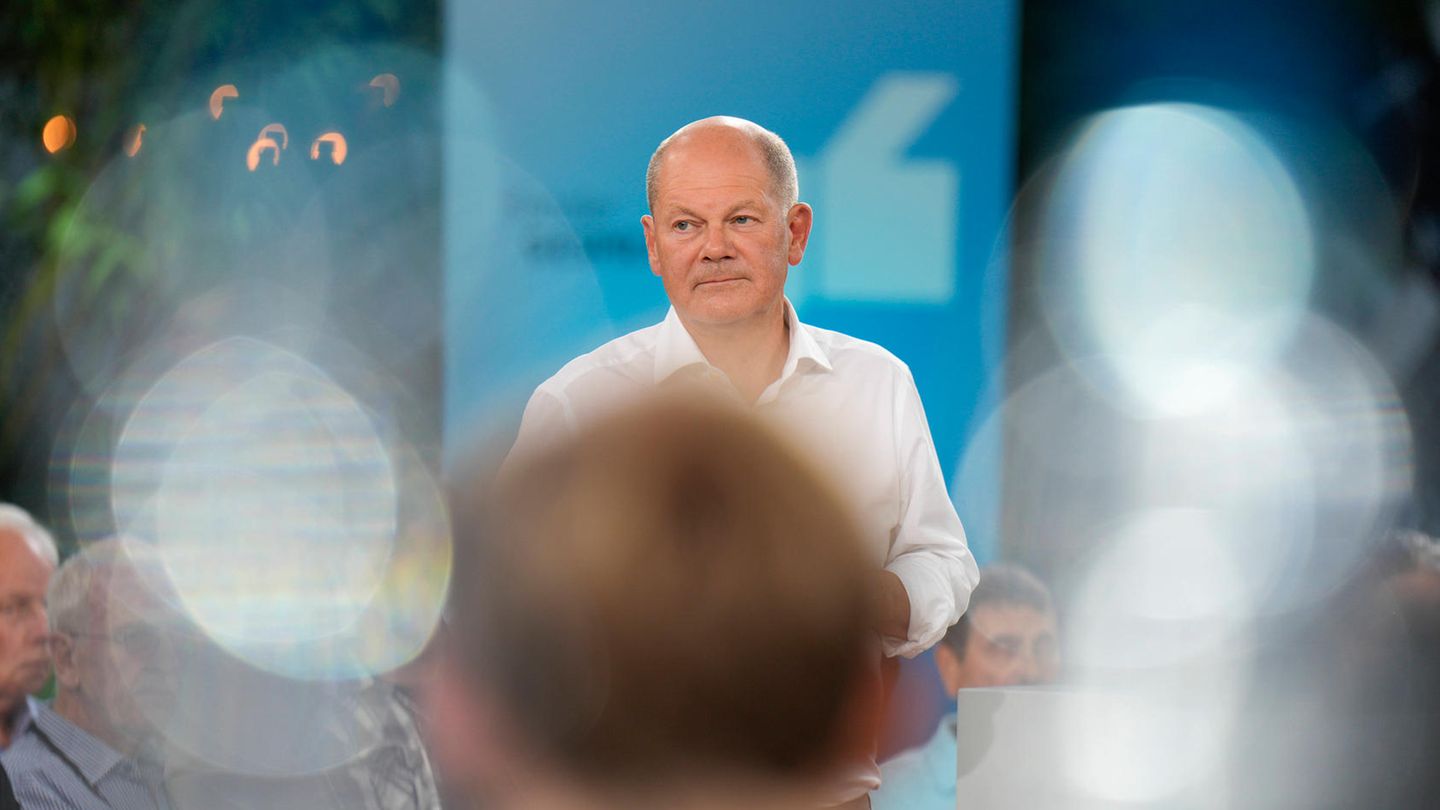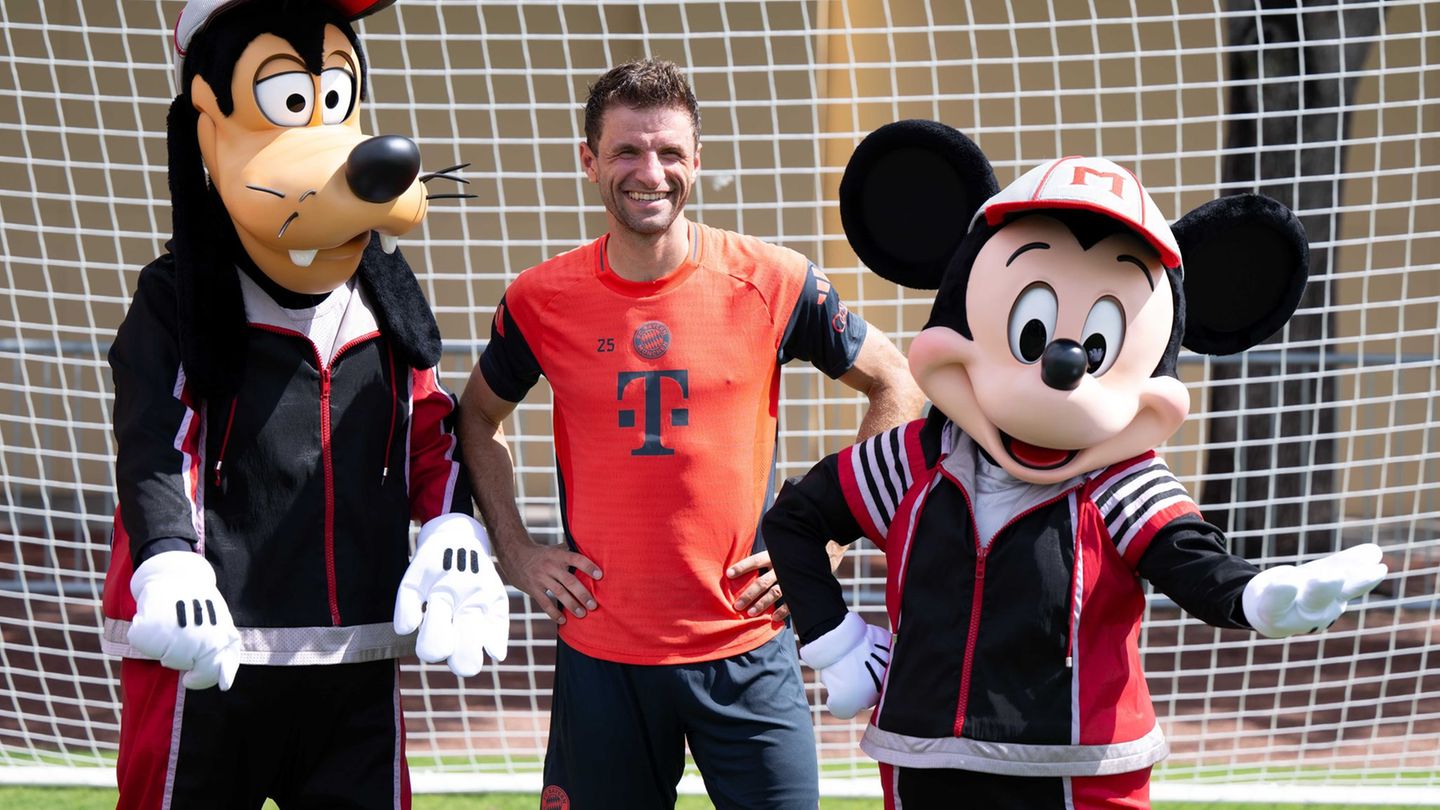The state elections have also hit Olaf Scholz and his SPD hard – and the next debacle could soon be imminent. But the Chancellor remains undeterred.
Olaf Scholz wants to answer with a counter question: “What is your magic formula?” He is asking for a friend, jokes the Chancellor, earning hearty laughter from the audience. Flattered once again.
But the question remains, and it is central to the continued existence of the traffic light coalition and Scholz’s chancellorship: How does he intend to correct the catastrophic image presented by the government? How does he intend to counteract the fatal impression that it is a case of squabbling children at work?
Olaf Scholz apparently has no answer to this, although he desperately needs one. Better yesterday than today. “You’re right,” says Scholz, slightly desperate. Now no one is laughing anymore.
Wednesday evening, a citizens’ dialogue with the Chancellor. Scholz sometimes has to wipe his hand over his head, which may be due to the many and varied questions from the randomly selected guests or the sweaty 30 degrees outside temperature. This time he is in Berlin – how fitting. The capital has long since become a source of great political disillusionment, at least in political terms. Last election Sunday showed this impressively.
Since then, many questions have been raised. How can a chancellor continue to govern when his coalition partners in Thuringia and Saxony only just managed to get over ten percent? All three of them together, mind you. And how long will his SPD, which has shrunk to a measly single-digit figure, stand by and watch this happen before it pulls the ripcord?
Scholz’s grace period could soon be over, and the next debacle could be imminent. For the Chancellor, everything is at stake these days.
Was there something?
So? Keep quiet, sort things out first. After the disaster, Scholz went into hiding, went to the SPD committees, but did not comment on the results in front of any cameras. As if he could keep the defeat(s) at bay if he just distanced himself far enough from them.
Finally, on Monday, he had a few sentences circulated, first via a news agency, then via Instagram: The results were “bitter – also for us,” said Scholz, but the “gloomy predictions” regarding the SPD had not come to pass. He meant: failure to clear the five percent hurdle. Appeasement formulas that did not go down well with the comrades.
At the Citizens’ Dialogue in Berlin, Scholz was asked about the consequences of the election. As a Social Democratic Chancellor, he allowed himself to comment that he would have “granted” the top candidates in Saxony and Thuringia “even better” results. Scholz believes that they could have done better, they would have run a good election campaign. He describes the election result for the AfD as depressing, and the growing support for populism as not good.
Was there something?
Now the “Chancellor’s Talk,” as the series is officially called, is not intended for the exegesis of the SPD’s results. But Scholz’s answer shows once again that self-criticism is not his greatest strength – and perhaps part of the problem.
Irregular migration, the war in Ukraine and social uncertainty have determined the elections, says Scholz. Post-election surveys confirm this. Scholz calls the “security package” that his government has put together the first deportations of criminals to Afghanistan. He also wants to continue his, in his opinion, “very prudent” course of support for Ukraine. However, the surveys have also shown that in Saxony and Thuringia the Chancellor and his government were also punished. Parenthesis: Actually, this was already the case in several state elections before.
Pressure on Olaf Scholz grows
In this respect, a fundamental question hovers over everything: Has the image of Scholz, the chancellor in whom voters clearly no longer have much confidence, already become irretrievably stuck? Or can it still be put right before the next federal election?
You have to get there. A lot can happen in 13 months, including, of course, a lot that could make Scholz a success as a reliable political professional who knows the ropes of government. After all, it already worked once in 2021.
However, the comrades are gradually losing patience and do not want to be “led around by the nose” any longer in the pugnacious traffic light coalition, as SPD General Secretary Kevin Kühnert grumbled on election night. Scholz is the “head of the government”, he said, and the people are noticeably “dissatisfied” with the government.
It was a clear indication that, from the perspective of the SPD leadership, something urgently needs to change – including the Chancellor, from whom more confrontation is now expected instead of moderation. More pure SPD and less consideration for the coalition partners.
That may be understandable, many comrades have long been extremely frustrated with the FDP, which seems to defend pure liberal doctrine even more vehemently after every election it loses. But the confrontational approach has so far been of little use to them. Why should it be any different with the SPD?
“I spoke to several people and then went home frustrated – because we talked past each other,” said Scholz at the citizens’ dialogue – not about FDP politicians, but about climate glue. Convincing others of your own opinion is “laborious,” said Scholz, but necessary. Otherwise, no common idea for solving problems can emerge.
He could also have said this sentence about his government, which has had to struggle for weeks to reach wishy-washy compromises.
This does not make things any easier for Scholz, of course. In just three weeks, when a new state parliament is elected in Brandenburg, his grace period could be over. If the Social Democrat Dietmar Woidke does not succeed in defending the State Chancellery – a red stronghold since 1991 – the pressure on the Chancellor is likely to increase massively. Could a dynamic develop that can no longer be contained: Is Scholz still the right person?
Prime Minister Woidke is distancing himself from Scholz in the election campaign and is largely renouncing his support. Woidke and the Brandenburg SPD want to be associated with Berlin as little as possible. However, it is unlikely that the traffic light coalition will not be involved in disputes before the election: next week, parliamentarians will return from their summer recess. Budget week is pure conflict.
Can this go well?
Shortly before the end, after around 90 minutes, Scholz is asked what he wants to remember. What might one day be written about him in the history books. The Chancellor answers: “People who know that before or after their term in office are people you should be afraid of.”
Source: Stern
I have been working in the news industry for over 6 years, first as a reporter and now as an editor. I have covered politics extensively, and my work has appeared in major newspapers and online news outlets around the world. In addition to my writing, I also contribute regularly to 24 Hours World.




